“I want you to be conscious of how much your patron is exploiting you with every bite of my sandwich.”
Clara Inés stands statuesque in her kitchen, each hand firmly weighed down into a steel prep table. All around is tupperware filled with unusual garnishes like pickled honeydew and mango marmalade. She quickly but methodically chooses her words and paints a portrait of a laborer cowered over their work station eating a miserable ham and cheese sandwich.
“Matambre was a project floating around in my head for a long time. The premise was making food that goes between two pieces of bread. Because, unfortunately, in this capitalist system we live in there’s no time for anything. There is no time to eat. But you can eat a sandwich while you work and I want it to be the best sandwich.”
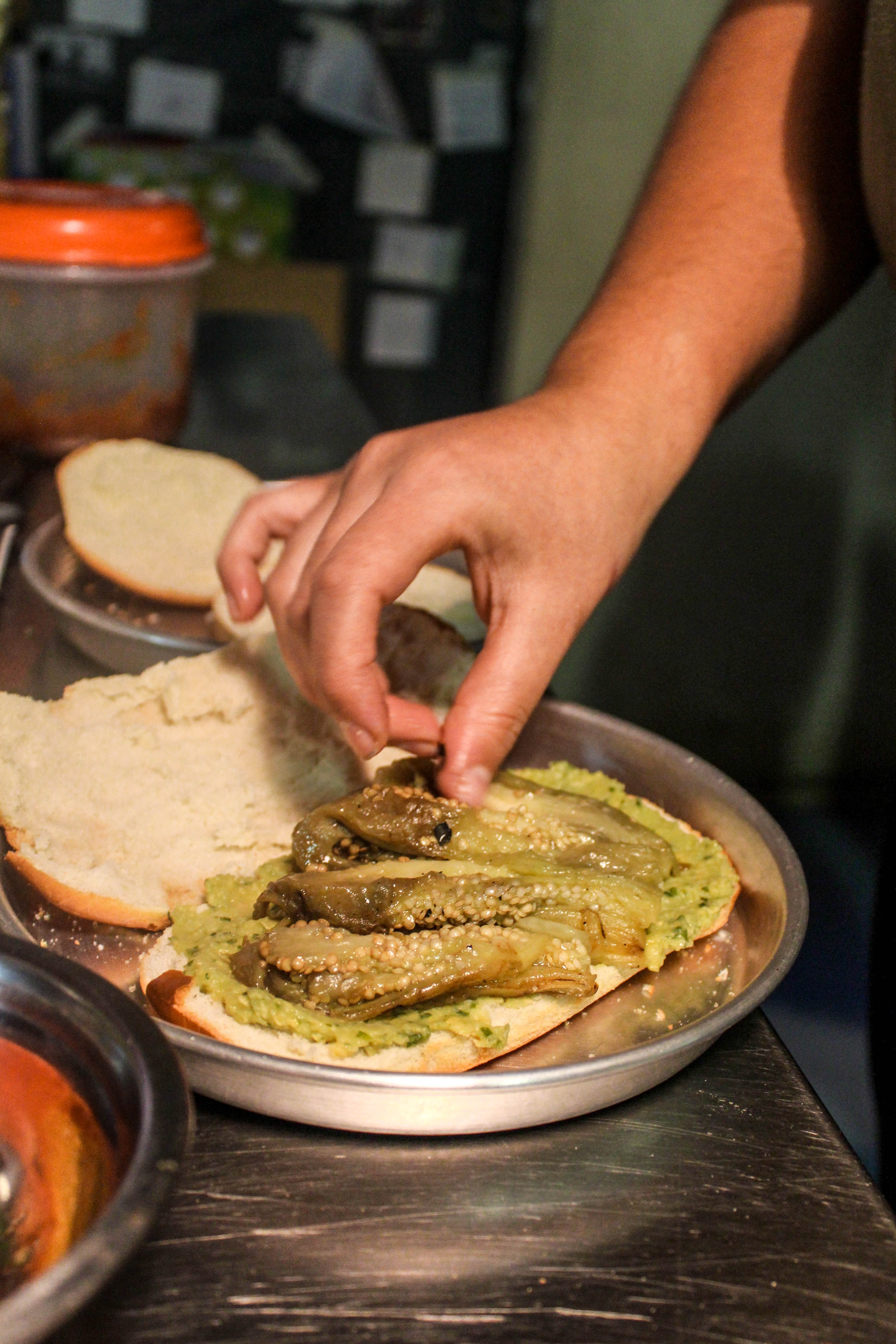
Inés rhapsodizes with the virtue of some sort of Gen X punk savant. Her hair is parted down the middle to highlight the long neon pink strands that flow over her right shoulder. A fierce septum piercing stands at a contrast to girlish purple glasses, and she sports a pair of shiny black leggings. Her partner, Jorgelina Mandarina, does too except her leggings are an acid trip kaleidoscope of space and color that are impossible to tear your gaze away from. Guadalupe Alpuin, who rounds out this cooking trio, has her hair pulled back tightly to show off her shaved sides.
Even amongst a new generation of like-minded cooks, Matambre’s trio sticks out like a sore thumb.
Buenos Aires is experiencing a revolution of the palate that has been in incubation for the last decade and feels like its just begun to breathe on its own. Porteños, native Buenos Aires residents, are beginning to pull away from the flavors that celebrate their strong Italian lineage and a general hard-on for Euro-centric culinary techniques. Rather than looking outward, cooks are beginning to look inward towards Latin America’s rich and varied food traditions.
Matambre Comida Salvaje is a small informal restaurant in the bohemian neighborhood of San Telmo that focuses on sandwiches, hamburgers and hot dogs. It lives up to its ‘wild’ moniker—everything is made from scratch utilizing unpopular cuts of meat and seasonal offerings. Even amongst a new generation of like-minded cooks, they stick out like a sore thumb.
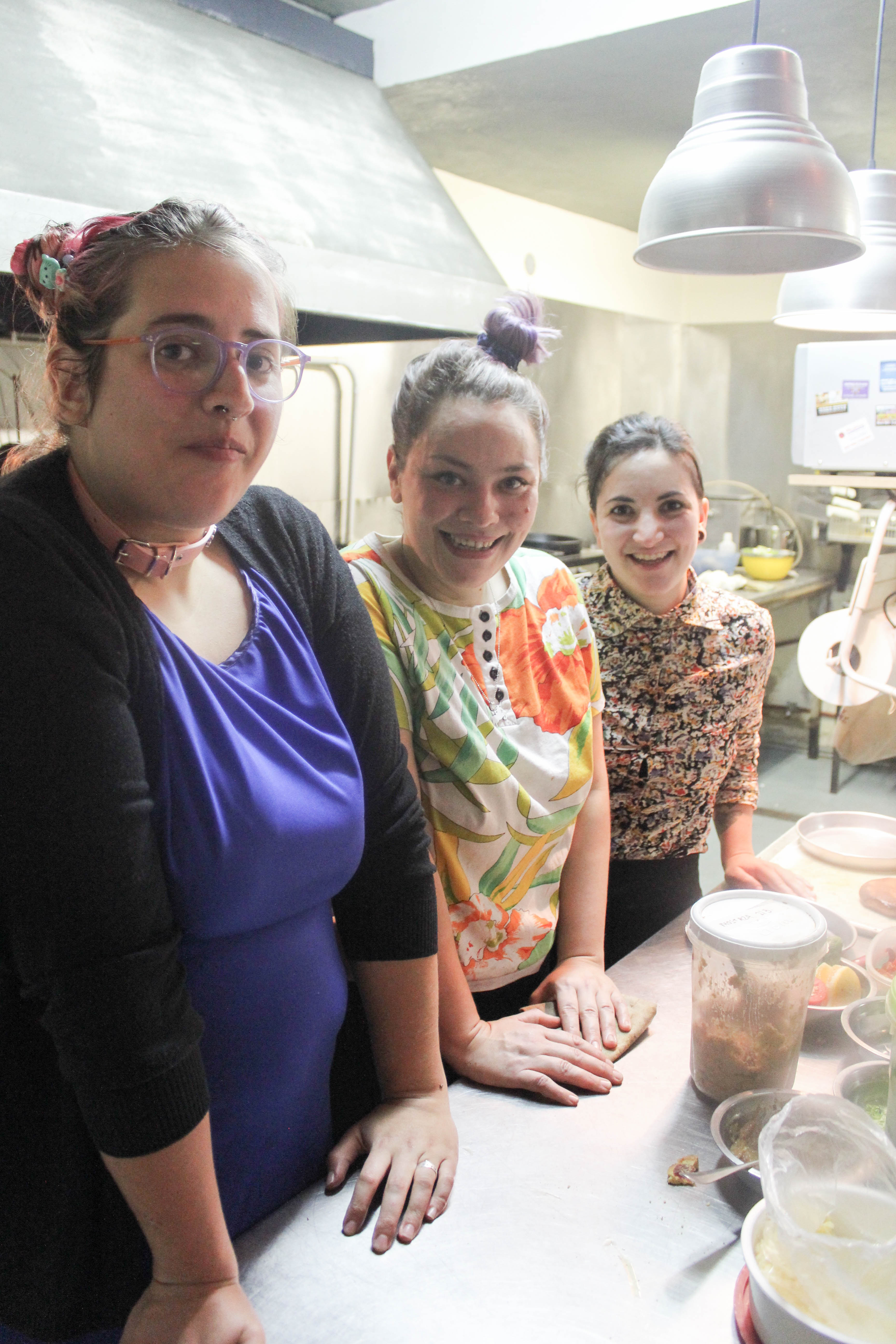
None of the women are professionally trained and they don’t give two shits about French technique—or any classical technique for that matter—instead opting for a hands-on education in the kitchen. “What technique did your mom use?” Inés asks me with a grin.
Their food is a completely personal exploration even when that comes at the cost of diners. The notion to cook for yourself and not to meet a bottom line, is in and of itself, a revolutionary act. Everything is eaten with your hands—forks and knives are almost strictly prohibited and a sign on the wall explains that your hands are your dish and your teeth are your silverware.
“We want a vegetarian to sit alongside a meat eater and not feel cheated out of a good meal.”
Odd for a culture that eats pizza with a fork and knife.
The food is messy. An alliance of egg yolk and loud sauces stick on your chin if they haven’t already bled on to your french fries. Flavors constitute a wild mixture of spicy, sweet, acidic, bitter and smokey, often on the same sandwich, and represent a bold departure from the city’s preference for singular taste combinations.
The common string that ties it all together is a sense of freedom and accessibility.
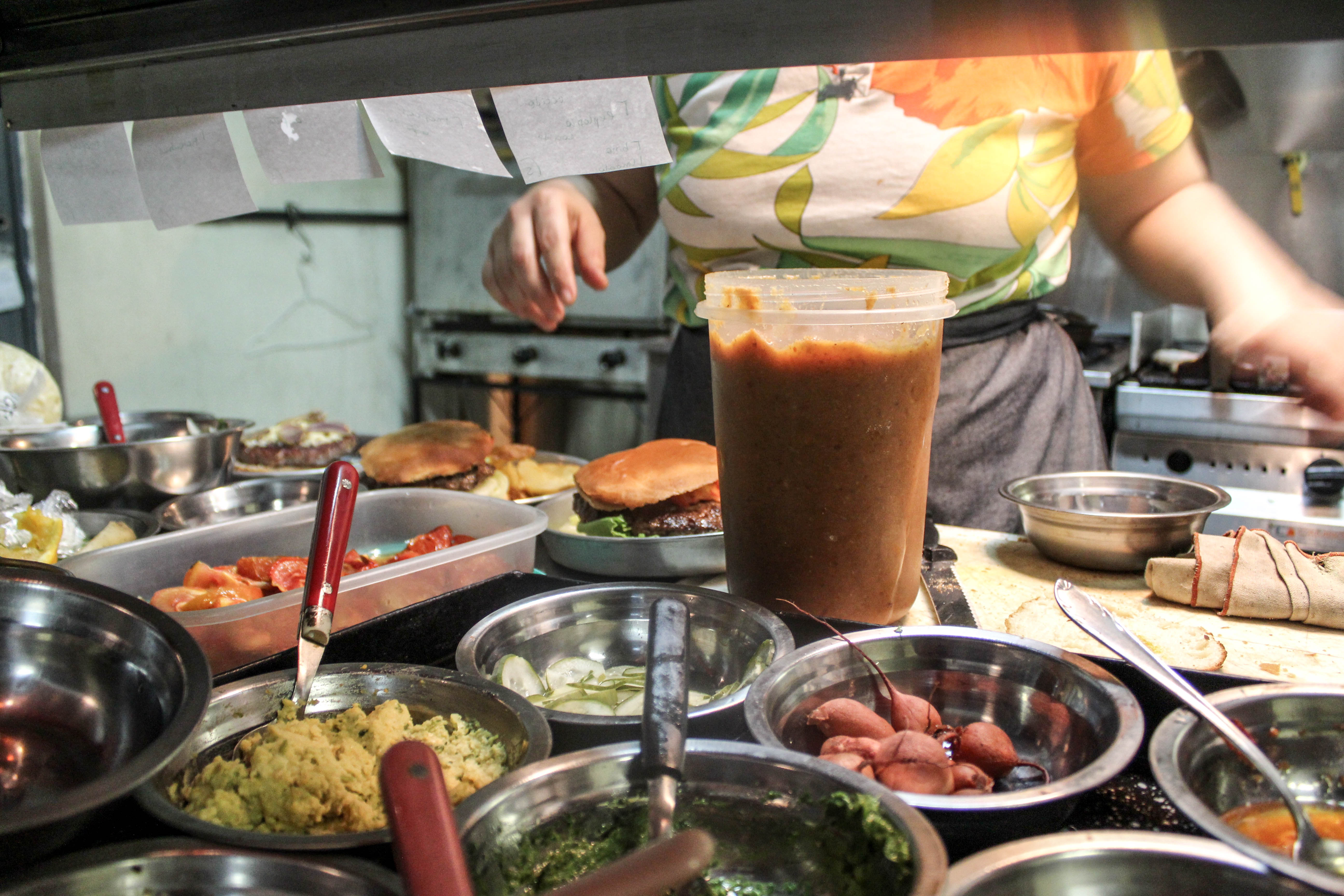
“I think what gets lost sometimes is that food is a basic right. We all need to eat. We are aware that this is a business and we need to make money to pay our rent and eat, and I don’t hate on the high end restaurants that investigate food in a different way. But we aren’t in this business to commodify food and make money off our customers. We are cheap because we are in the midst of a crisis and people need to eat. Our water is free because water is not a business.”
Likewise, there are dishes for carnivores, vegetarians and vegans alike and everyone gets the same treatment. Alpuin, the resident vegetarian explains her experiences eating in Argentina.
Here, politics are served on a metal platter.
“When I went out to eat with my friends, all that I could order was a plate of french fries or a bad salad. Here, we want a vegetarian to sit alongside a meat eater and not feel cheated out of a good meal.”
The trio balances long hours flipping choriburgers—a chorizo patty topped with gooey cheese and a tropical marmalade—with parallel lives as activists, poets and actresses. This all female-run kitchen feels as if Julia Childs has started a cumbia band with Miley Cyrus, Neil deGrasse Tyson, Betty Freidan and Damas Gratis frontman Pablo Lescano. The line between anti-capitalism, feminism, social responsibility and food isn’t blurred; here, politics are served on a metal platter. Whereas most restaurants function as safe spaces to escape from a polarized populace, Matambre seeks out reflection.
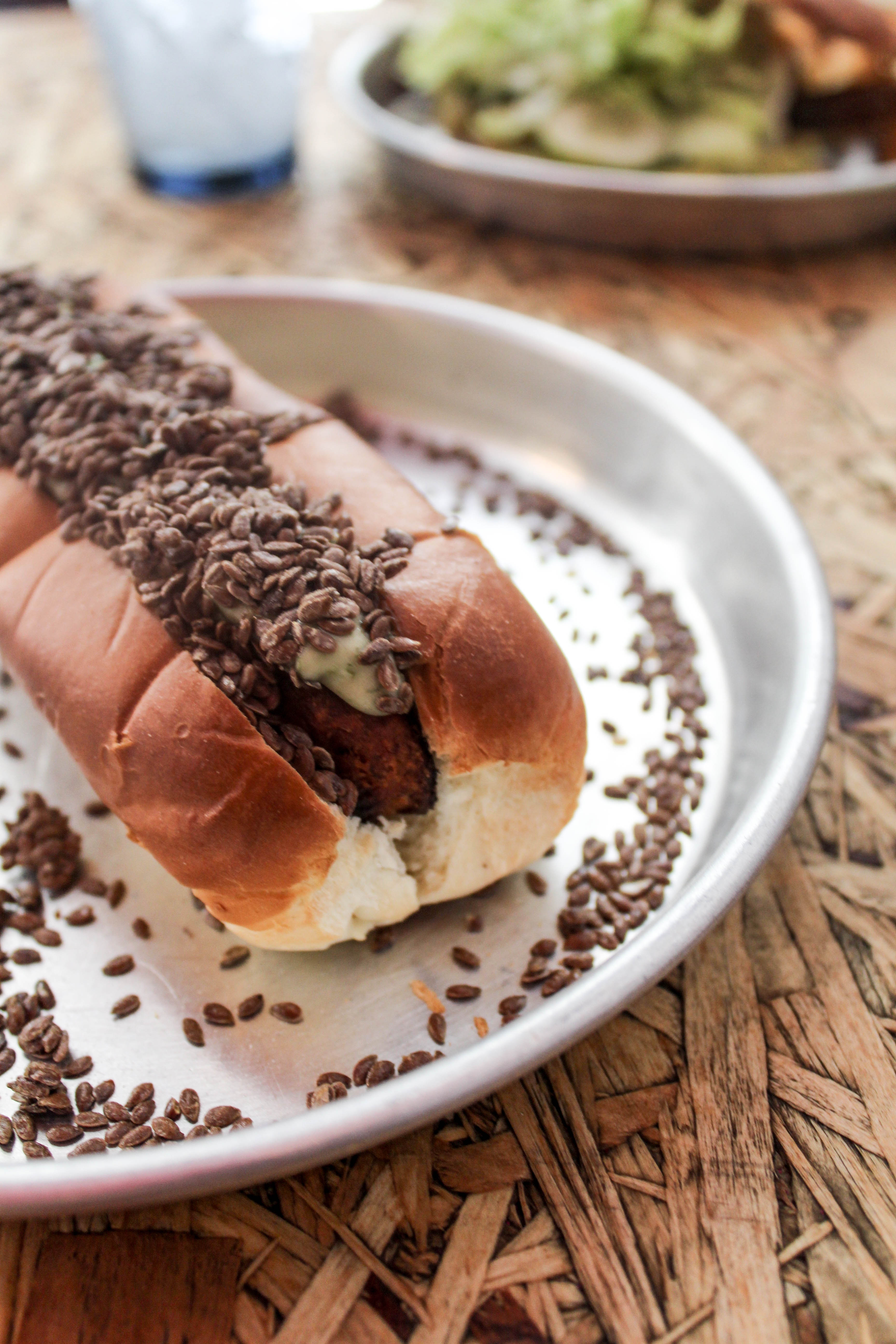
“Every action is a political decision whether it is a conscious one or not,” explains Alpuin, “This idea that you can take yourself out of the political system is a farce. A lot of decisions are made in Matambre that we aren’t necessarily aware of, they are just us, and others are actions that we discuss and debate at length.”
Their approach is evident in the restaurant’s decor. A pride flag anchors down the middle of the room. Another poster reads, “Macri es ajuste,” a popular political idiom of the left that connects Argentina’s sitting President to the nation’s most current economic crisis in the form of sacked government subsidies, public sector lay-offs, currency devaluation and continuing inflation.
You can also see it in their carefully-considered menu, on which untraditional cuts of meat are purposely included.
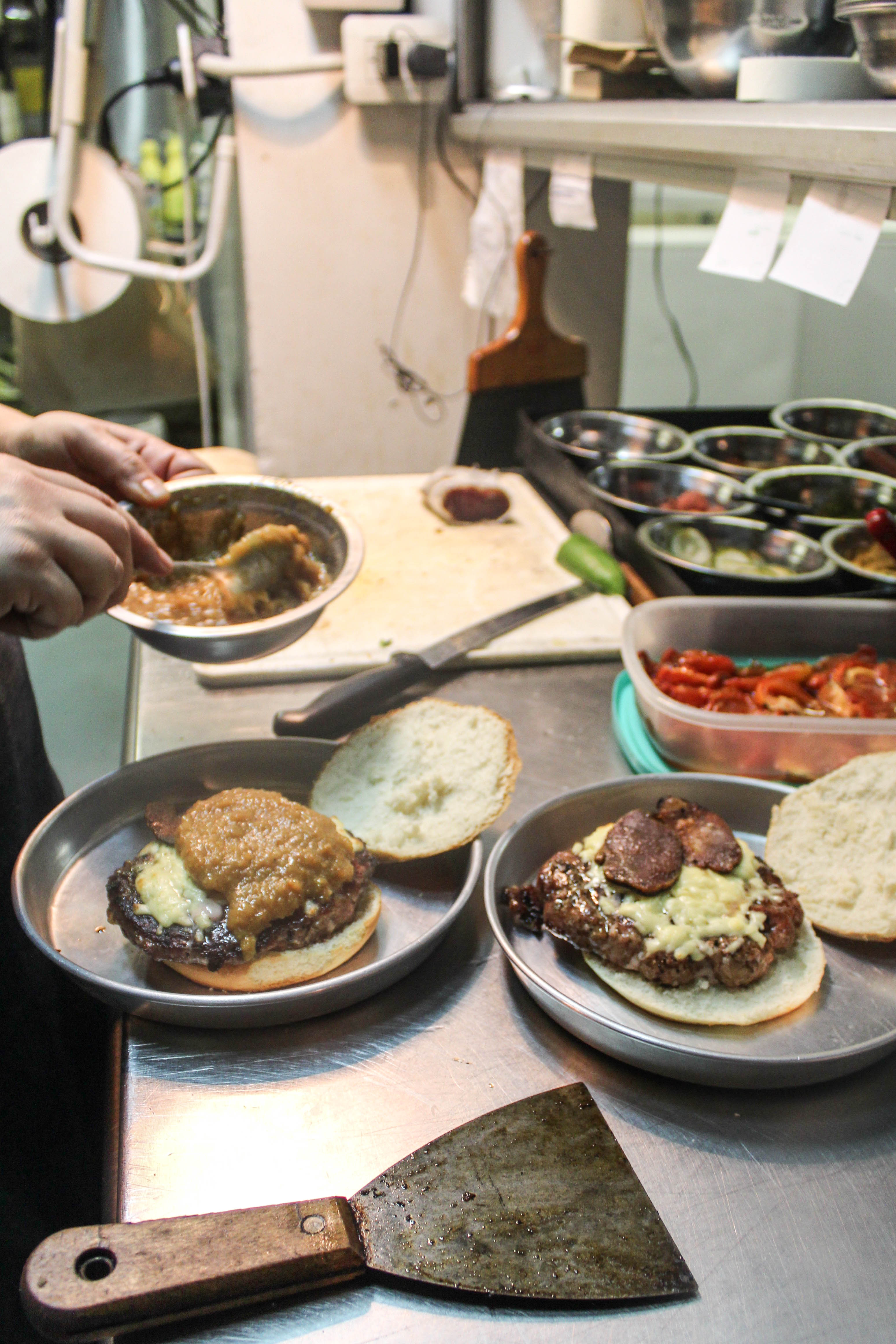
“My grandparents cooked everything from scratch and used every part of the animal,” explains Mandarina. “They even collected the chicken feathers to use for pillow stuffing. So for me, it’s important to make everything by hand and to be responsible with the products we use. It’s important to use meats that are normally tossed out and celebrate them with something delicious. I’m not going to use an expensive tenderloin that makes up a tiny percentage of the cow when I we can use a leg or an entrail that’s often overlooked.”
During days of protest, whether it be a women’s march or a worker’s strike, they frequently close shop to participate. Their use of language—both on social media and their daily speech patterns—is inclusive use of gender neutral ‘x’ or ‘e’ rather than the Spanish masculine feminine pronouns and endings.

“I’m sure we’ve lost customers that have come in and see who we are, or people just don’t come in at all.”
But while Matambre may not be to everyone’s taste, a packed house during a Friday night party shows no lacking of like-minded supporters. The tables are crammed together to form one long communal surface and a crowd of hungry punks with technicolor manes roar loudly for a string of local poets.
Mandarina comes out of the kitchen to take the spotlight and tells the story of love lost to a tumultuous romance (the night’s theme: “There’s a teardrop on my choriburger.”) After all the sacrifices she made, after putting herself on the line and exposing herself, it was worth it in the end, she declares.
Why? Because out of the struggle the world saw the birth of the choriburger.







